6 books about Indigenous Women
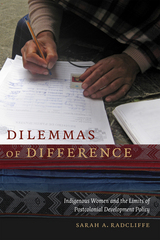
Dilemmas of Difference
Indigenous Women and the Limits of Postcolonial Development Policy
Sarah A. Radcliffe
Duke University Press, 2015
In Dilemmas of Difference Sarah A. Radcliffe explores the relationship of rural indigenous women in Ecuador to the development policies and actors that are ostensibly there to help ameliorate social and economic inequality. Radcliffe finds that development policies’s inability to recognize and reckon with the legacies of colonialism reinforces long-standing social hierarchies, thereby reproducing the very poverty and disempowerment they are there to solve. This ineffectiveness results from failures to acknowledge the local population's diversity and a lack of accounting for the complex intersections of gender, race, ethnicity, class, and geography. As a result, projects often fail to match beneficiaries' needs, certain groups are made invisible, and indigenous women become excluded from positions of authority. Drawing from a mix of ethnographic fieldwork and postcolonial and social theory, Radcliffe centers the perspectives of indigenous women to show how they craft practices and epistemologies that critique ineffective development methods, inform their political agendas, and shape their strategic interventions in public policy debates.
[more]

Implicating the System
Judicial Discourses in Sentencing of Indigenous Women
Elspeth Kaiser-Derrick
University of Manitoba Press, 2019
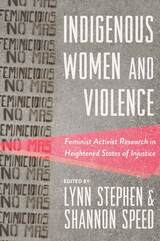
Indigenous Women and Violence
Feminist Activist Research in Heightened States of Injustice
Edited by Lynn Stephen and Shannon Speed
University of Arizona Press, 2021
Indigenous Women and Violence offers an intimate view of how settler colonialism and other structural forms of power and inequality created accumulated violences in the lives of Indigenous women. This volume uncovers how these Indigenous women resist violence in Mexico, Central America, and the United States, centering on the topics of femicide, immigration, human rights violations, the criminal justice system, and Indigenous justice. Taking on the issues of our times, Indigenous Women and Violence calls for the deepening of collaborative ethnographies through community engagement and performing research as an embodied experience. This book brings together settler colonialism, feminist ethnography, collaborative and activist ethnography, emotional communities, and standpoint research to look at the links between structural, extreme, and everyday violences across time and space.
Indigenous Women and Violence is built on engaging case studies that highlight the individual and collective struggles that Indigenous women face from the racial and gendered oppression that structures their lives. Gendered violence has always been a part of the genocidal and assimilationist projects of settler colonialism, and it remains so today. These structures—and the forms of violence inherent to them—are driving criminalization and victimization of Indigenous men and women, leading to escalating levels of assassination, incarceration, or transnational displacement of Indigenous people, and especially Indigenous women.
This volume brings together the potent ethnographic research of eight scholars who have dedicated their careers to illuminating the ways in which Indigenous women have challenged communities, states, legal systems, and social movements to promote gender justice. The chapters in this book are engaged, feminist, collaborative, and activism focused, conveying powerful messages about the resilience and resistance of Indigenous women in the face of violence and systemic oppression.
Contributors: R. Aída Hernández-Castillo, Morna Macleod, Mariana Mora, María Teresa Sierra, Shannon Speed, Lynn Stephen, Margo Tamez, Irma Alicia Velásquez Nimatuj
Indigenous Women and Violence is built on engaging case studies that highlight the individual and collective struggles that Indigenous women face from the racial and gendered oppression that structures their lives. Gendered violence has always been a part of the genocidal and assimilationist projects of settler colonialism, and it remains so today. These structures—and the forms of violence inherent to them—are driving criminalization and victimization of Indigenous men and women, leading to escalating levels of assassination, incarceration, or transnational displacement of Indigenous people, and especially Indigenous women.
This volume brings together the potent ethnographic research of eight scholars who have dedicated their careers to illuminating the ways in which Indigenous women have challenged communities, states, legal systems, and social movements to promote gender justice. The chapters in this book are engaged, feminist, collaborative, and activism focused, conveying powerful messages about the resilience and resistance of Indigenous women in the face of violence and systemic oppression.
Contributors: R. Aída Hernández-Castillo, Morna Macleod, Mariana Mora, María Teresa Sierra, Shannon Speed, Lynn Stephen, Margo Tamez, Irma Alicia Velásquez Nimatuj
[more]
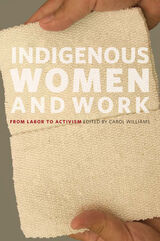
Indigenous Women and Work
From Labor to Activism
Edited by Carol Williams
University of Illinois Press, 2012
The essays in Indigenous Women and Work create a transnational and comparative dialogue on the history of the productive and reproductive lives and circumstances of Indigenous women from the late nineteenth century to the present in the United States, Australia, New Zealand/Aotearoa, and Canada. Surveying the spectrum of Indigenous women's lives and circumstances as workers, both waged and unwaged, the contributors offer varied perspectives on the ways women's work has contributed to the survival of communities in the face of ongoing tensions between assimilation and colonization. They also interpret how individual nations have conceived of Indigenous women as workers and, in turn, convert these assumptions and definitions into policy and practice. The essays address the intersection of Indigenous, women's, and labor history, but will also be useful to contemporary policy makers, tribal activists, and Native American women's advocacy associations.
Contributors are Tracey Banivanua Mar, Marlene Brant Castellano, Cathleen D. Cahill, Brenda J. Child, Sherry Farrell Racette, Chris Friday, Aroha Harris, Faye HeavyShield, Heather A. Howard, Margaret D. Jacobs, Alice Littlefield, Cybèle Locke, Mary Jane Logan McCallum, Kathy M'Closkey, Colleen O'Neill, Beth H. Piatote, Susan Roy, Lynette Russell, Joan Sangster, Ruth Taylor, and Carol Williams.
[more]
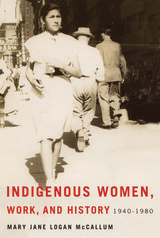
Indigenous Women, Work, and History
Mary Jane Logan McCallum
University of Manitoba Press, 2014
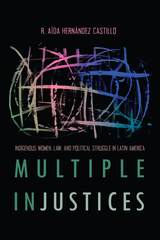
Multiple InJustices
Indigenous Women, Law, and Political Struggle in Latin America
R. Aída Hernández Castillo
University of Arizona Press, 2016
The last two decades have witnessed two political transformations that have deeply affected the lives of the indigenous peoples of Latin America. First, a discourse on indigeneity has emerged that links local struggles across the continent with transnational movements whose core issues are racism and political and cultural rights. Second, recent constitutional reforms in several countries recognize the multicultural character of Latin American countries and the legal pluralism that necessarily follows.
Multiple InJustices synthesizes R. Aída Hernández Castillo’s twenty-four years of activism and research among indigenous women’s organizations in Latin America. As both feminist and critical anthropologist, Hernández Castillo analyzes the context of legal pluralism wherein the indigenous women of Mexico, Guatemala, and Colombia struggle for justice. Through ethnographical research in community, state, and international justice, she reflects on the possibilities and limitations of customary, national, and international law for indigenous women.
Colonialism, racism, and patriarchal violence have been fundamental elements for the reproduction of capitalism, Hernández Castillo asserts. Only a social policy that offers economic alternatives based on distribution of wealth and a real recognition of cultural and political rights of indigenous peoples can counter the damage of outside forces such as drug cartels on indigenous lands.
She concludes that the theories of indigenous women on culture, tradition, and gender equity—as expressed in political documents, event reports, public discourse, and their intellectual writings—are key factors in the decolonization of Latin American feminisms and social justice for all.
Multiple InJustices synthesizes R. Aída Hernández Castillo’s twenty-four years of activism and research among indigenous women’s organizations in Latin America. As both feminist and critical anthropologist, Hernández Castillo analyzes the context of legal pluralism wherein the indigenous women of Mexico, Guatemala, and Colombia struggle for justice. Through ethnographical research in community, state, and international justice, she reflects on the possibilities and limitations of customary, national, and international law for indigenous women.
Colonialism, racism, and patriarchal violence have been fundamental elements for the reproduction of capitalism, Hernández Castillo asserts. Only a social policy that offers economic alternatives based on distribution of wealth and a real recognition of cultural and political rights of indigenous peoples can counter the damage of outside forces such as drug cartels on indigenous lands.
She concludes that the theories of indigenous women on culture, tradition, and gender equity—as expressed in political documents, event reports, public discourse, and their intellectual writings—are key factors in the decolonization of Latin American feminisms and social justice for all.
[more]
READERS
Browse our collection.
PUBLISHERS
See BiblioVault's publisher services.
STUDENT SERVICES
Files for college accessibility offices.
UChicago Accessibility Resources
home | accessibility | search | about | contact us
BiblioVault ® 2001 - 2024
The University of Chicago Press









